James Rozoff's Blog, page 2
August 18, 2024
It Doesn’t Take A Whole Lot Of Fascists To Spoil A Movement (But The U.S. State Department Is Okay With That)
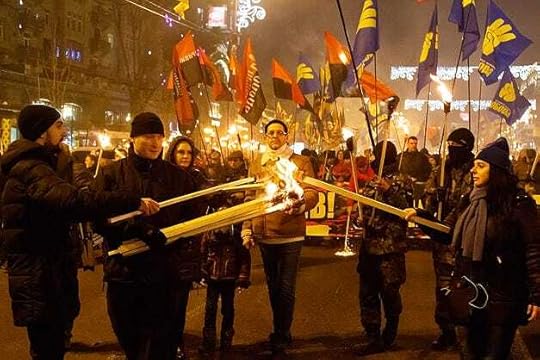
I just watched the opening minutes of the film Winter On Fire, a movie made in response to Oliver Stone’s movie Ukraine On Fire. As opposed to Oliver Stone’s movie which explained how the U.S. supported a coup in Ukraine and was willing to work with the worst kind of fascists and neo-Nazis to do it, Winter On Fire took the official U.S. line on the events of 2013–4. In case you were wondering, it was WAY easier to find than Oliver Stone’s film. In fact I wasn’t even looking for it, I just stumbled upon it while looking for a good documentary to watch.
The movie opens with an interview of a pro-revolution protestor speaking about the leadup to the protests. The camera pans out to reveal he is wearing a scarf with the image of Stepan Bandera on it. Within a moment or two, the red and black flag of UNSO (the military arm of UNA) can be seen in the background. This flag is ubiquitous in the background (or foreground) of almost all the footage I watched (I only watched the first twenty minutes or so). The fact that the creators of the documentary found it either impossible or unnecessary to avoid overt Nazi imagery is telling.
There are those who will say that Bandera wasn’t really that bad a guy, and that even if he was, the people with pictures of him on their wall or with tattoos of him on their bodies are really just inspired by the fact that he fought for Ukrainian independence. Let’s do a quick dive into the history of Stepan Bandera, courtesy of Wikipedia:
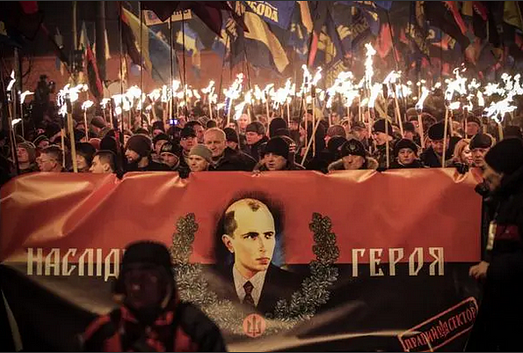 An Image Of Stepan Bandera Against An OUN Flag
An Image Of Stepan Bandera Against An OUN FlagBandera was a key member of OUN, a group of Ukrainian nationalists who used terrorism and assassination against the Polish government. The OUN employed “bomb-throwing at Polish exhibitions and murders of policemen,” among other tactics. Bandera was arrested and sentenced to death for his involvement in terrorism, a sentence that was later commuted to life in prison. The OUN worked closely with NAZI intelligence to aid their invasion of Poland, and later helped to form the Waffen-SS Galizien division, perhaps the most vicious of all the SS groups.
Much revisionist history has taken place in the last decade to minimize the crimes of Bandera and the OUN, a necessity since their images, flags, and tattoos seem to be ever-present amongst the propaganda images and video of the west. Not just in this documentary but in many interviews of various Ukrainians on mainstream media. So let me cite a source that predated the events of the last two decades in order to get a more fairly balanced view of the symbology that is so prevalent in Ukraine.
The book Fascism: Past, Present and Future was written by Walter Laqueur and published in 1996. No wacko rightwing or leftwing nutjob, Laqueur was for 25 years the director of one of the world’s leading institutes for the study of fascism, London’s Wiener Holocaust Library. According to Laqueur, the red and black flags that are so prevalent among the protests belong to the UNSO, which is the paramilitary arm of the UNA, a successor group of OUN. To summarize, those red and black flags belong to a paramilitary group that considers itself the successor to the Ukrainian SS division, a group that even the German SS found especially reprehensible. The slogans of the UNSO are “War is our future” and “Provocation, revolt, revolution” (p. 213).
One might wonder why in 2014, with Ukraine being ostensibly a democracy, they felt revolution was necessary, until one recalls that the Weimar Republic was also a democracy.
Besides saying that Bandera and the UON we’re not that bad, western media is also fond of saying that the far-right elements involved in Ukrainian politics is a small minority. That is true, but the question is what percentage of ethnocentric nationalists, who take as their inspiration a truly genocidal movement, is acceptable. In United Sates politics according to liberal media, that would be zero percent. A single Confederate flag at a MAGA rally, or a Nazi flag — even if it is used to call the other side Nazis — instantly brands everyone there a racist and a fascist. I don’t necessarily think this is fair, whether we are discussing Ukrainian protests or Trump supporters, but if I were a supporter of either Trump or Ukraine, I would be careful whom I allowed in my protests.
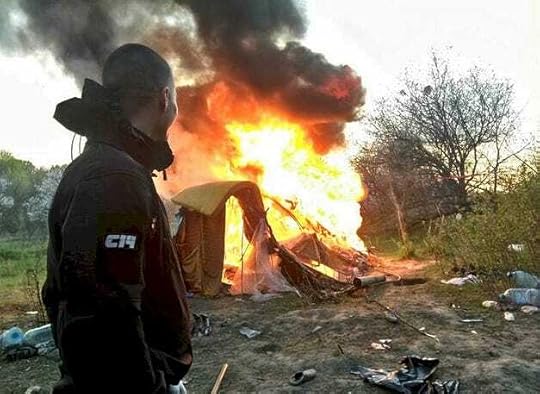
Yevgeny Karas, the leader of the far-right group C14, was asked to comment on the fact that the extreme right only accounted for ten percent of the protestors involved in the Maidan Revolution. He replied that it was perhaps only eight percent of the crowd, but if it were not for them “the protests would have turned into a gay pride parade”. It doesn’t take a lot of violence-prone racists to change the course of a protest or a revolution.
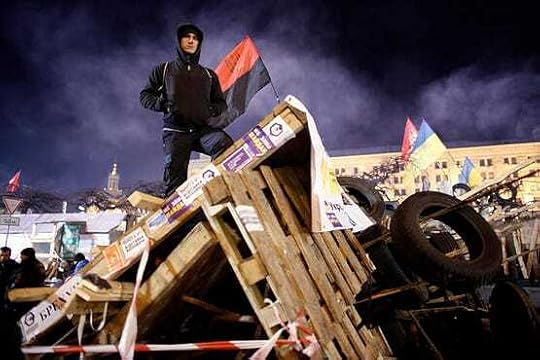 Photo by Marko Djurica
Photo by Marko DjuricaTo see the extent of the violence employed during the Maidan protests, it is recommended that you view Oliver Stone’s Ukraine On Fire (if you can find it). Compared to the documented violence that occurred in Kiev, January 6th looks as non-violent as a gay pride parade.
There is a moment in the movie Battleship Potemkin where the people gather together and decide the government must be brought down. In the midst of the excitement, one member of the crowd shouts: “Down with the Jews!” The crowd turns towards to where the voice came from, and the man who spoke the words realizes the crowd is not with him. The man pulls up his collar, pulls down his hat, and tries to slip away unseen. But the crowd is onto him. They surround him, and begin to pummel him.
This is what the protestors at Maidan should have done to the people overtly proclaiming their affinity for genocidal fascists. This happens in U.S. protests all the time. I’ve seen video of MAGA protestors chasing away provocateurs trying to incite violence. I’ve seen BLM protestors do the same. If you have a legitimate cause you are fighting for, it is essential that you do not allow such people to worm their way into your movement.
The fact that the peaceful protestors did shows either their ignorance of their own history or a fear of confronting the far right. If they were ignorant of their history, it is likely because of an undue influence of Western intelligence in their culture. Russia or the Soviet Union never would have permitted them to forget history when it came to Nazis. If it is because they feared groups such as C-14, The Svoboda party, and Right Sector, then clearly these groups had a greater influence on the protests than what western “experts” claim.
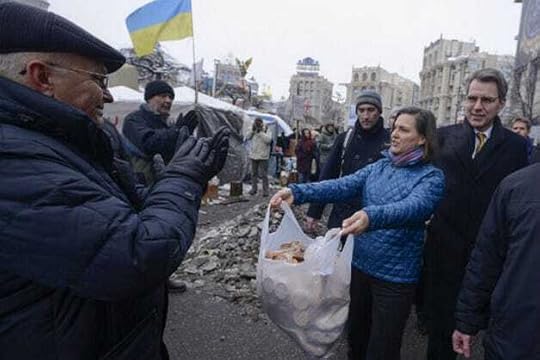
Among the protestors, non-violent and otherwise, U.S. Assistant Secretary of State Victoria Nuland handed out cookies. Despite being Jewish, Nuland to my knowledge never uttered a word of concern about far-right groups that espoused violent and antisemitic sentiments. This would be shocking, if anything the U.S. did in foreign politics had any shock value anymore. From Saddam Hussein to Osama bin Laden, MEK to ISIS, there is no one the U.S. will not supply weapons to or urge to violence.
Like the protestors in Ukraine, we are to blame for permitting such promotors of violence to exist among us. If we continue to tolerate them, they will soon employ violence, coercion and lies to co-opt our society and government. Oh, wait, that happened a long time ago.
February 18, 2024
Revolution Through Embracing Simplicity
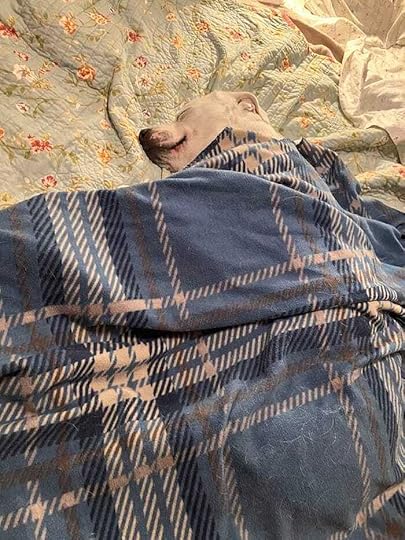
In the last few years’ I’ve become more aware of how wonderful a thing it is to breathe. It’s not like I’ve recovered from a pulmonary disease or a near-drowning experience or anything, I’ve just come to appreciate the pleasant sensation that accompanies air moving in and out of my lungs. I feel it now, a slight tickle in what I imagine might be my capillaries.
It’s odd that I never really seemed to be aware of this before. God knows my lungs are not what they once were, having smoked cigarettes for decades. You’d think in my youth I would have occasionally marveled at this feeling, seeing as how all physical sensation seems heightened in youth.
Perhaps this awareness started to evolve a dozen or more years ago when I finally kicked the nicotine addiction, choosing fresh air over poisonous smoke. Sometimes getting a second chance at life makes us appreciate it more.
I’ve also noticed of late how good it feels to move. Again, I cannot move as I once did in my twenties or in childhood. But when I allow my body to move at its own speed, to exert itself with an appropriate force, I am reminded that bodies are meant to move, are happiest in motion. If I only meet it on its terms and do not try to force it to be what I want it to be, but allow it to be what it is, it will not merely respond but do so joyfully. I am not just some lump of clay but the energy that moves through it. I may be dependent upon my limited frame, but it is not all that I am.
I can feel this way in a factory, where the air is not sweet and the sounds are not that of nature. Do not get me wrong, I prefer nature, but I can transcend my surroundings. Sometimes I lie awake at night and feel my breathing, and think of how wonderful it is to be alive. And while I appreciate it that my wife is next to me and our dog is between us, if I were alone, I would still be aware of how pleasant a thing it is to breathe.
I lie in bed and breathe, thankful for the modest but comforting blanket on top of me. I enjoy the coolness of the air mixed with the blanket’s ability to moderate it. If I inhale deeply, I might get a whiff of the simple but extremely enriching meal that my wife made earlier. Such wonderful smells tend to pervade the household and hang around. There are leftovers in the refrigerator and we will have the opportunity to dine on it again tomorrow.
Life is simple. Happiness is simple. The true joys of life do not require fighting over. There is more than enough for all. I sometimes ask myself, late at night when the air is brisk but the blanket is comforting, why we must fight so bitterly for the things that do not make us happy. Why do we focus on other things when simply acknowledging the beauty of the moment has the power to bring us contentment? Sometimes I feel that we as a species are throwing everything away, everything, for things that do not matter at all, for things that do not bring joy but only distract us from it.
I think of such things, and I open myself up to an immense sadness for what we have to lose. The world is dominated by those who fear and crave and hate but who clearly do not appreciate the simple joy of breathing. Such people are leading our society, our species, our entire planet to ruin. Like others, I have tasted despair and quiet desperation in my life, and I know they still call to me, not as a solution but as a resignation.
But then I become aware of my breathing. I hear my dog’s inhalations next to me, free from all the concerns we humans have. I could lose myself to despair, but that would help nobody, least of all myself. I accept the simple comforts the universe has provided me. With gratitude. With joy. Perhaps, if I can appreciate fully such simple things, others might come to ask me what it is that makes me so at peace, so contented, so joyful. I can think of no other way to get people to cease their pursuit of useless acquisitions, to choose a path of peace rather than a path of violence and domination.
I’ve tried other ways, and they did nothing to change the world, they only made me forget how wonderful it is to breathe, how wonderful it is to be alive. I feel it now.
August 29, 2023
Most Welcome Squatters On My Property
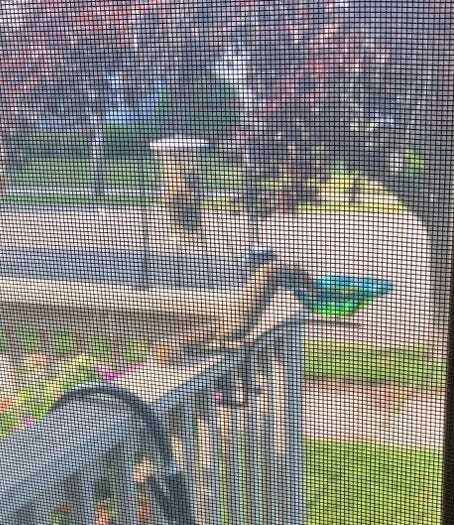
There is a loud rustling on my front porch, so I arise to see if the chipmunk has returned to the bird feeder. As I look out the window a large squirrel lands with a crash on the porch railing, no more than a yard from where I stand inside the house. This frightens the feeding birds to flight and, truth be known, gives me a bit of a start as well. But the squirrel is not there for the bird food, at least not immediately. He is there to slake his thirst, which he does by climbing entirely into the water bowl my wife has set out and diligently fills. Sensing my presence, he jumps out before I am able to snap a picture, but he soon leans back into the water bowl to drink his fill.
As I watch the squirrel on the porch, I notice the chipmunk moving below on the ground. No doubt he has designs on climbing up to the little basket that sits below the bird feeder to catch what the birds so messily drop. I have no idea how he manages to get up there, but I admire his determination. He for his part seems to have little fear of us, and when I come back from a walk to find him in the basket, instead of fleeing for his life, he simply engages me in a staring contest. Even the 90 pound Great Pyrenees that accompanies me on my walks holds little concern for the chipmunk.

A rabbit hops in my backyard, but I am too slow and he is too wary for me to take a good picture. I am amazed that a rabbit is willing to enter the boundaries of my property at all, seeing as it must contain within it evidence of a large though admittedly not so fierce dog. Surely it must know that no dog other than Snoopy is a friend to bunnies. But perhaps it is because he smells the scent of other animals here that he feels safe. Perhaps dog urine is less offensive to his senses than the sort of chemicals people use on their lawns in order to kill the clover that keeps the honey bees alive. Or perhaps it is the vegetables my wife grows which make the rabbits willing to risk being chased by a canine.

My wife does all the work of making our property more hospitable to plants and animals. She grows milkweed, cone flowers and black-eyed Susans for the butterflies and lemon balm and bee balm for the bees. I do my part by being too lazy to use chemicals or pesticides. I only participate in no-mow May because it gets me out of having to cut the grass. But my laziness has enabled the flowering weeds to grow, much to the delight of the bees.
Recently I managed to muster up the energy (or perhaps it was shame) to rake up a patch of Creeping Charlie, inconveniencing a bee intent on sucking nectar from its tiny blooms. I informed him that we would be planting clover on the space where I was now removing the weeds, but he merely buzzed his disapproval. I informed him that I had let some dandelions standing in the backyard for him, but he was rather unwilling to let go of the little purple flowers.

A week later, on a hot day, I was out watering the same area in hopes of summoning forth clover from the seeds we had scattered. A robin alighted nearby, and I couldn’t help getting the impression that she was hoping I would turn the hose on her. Using the mist option, I allowed the fine drops to fall upon her and she did not move away. In fact, I have to believe she appreciated and understood I was replying to a request she had made.

I have come to suspect that the little property that surrounds our houses have some purpose beyond impressing our human neighbors. That our responsibility is not to maintain human standards of aesthetics so much as make them little havens for the plants and creatures we evicted from the neighborhood when we decided to tear up trees in order to build homes and pave streets. Furthermore, I don’t think we do all the lawn work we do just to impress the neighbors but also because we feel we are being judged by them. As for me, I don’t care if the neighbors judge me on the quantity of dandelions in my yard. Ask any chipmunk, squirrel, or robin, and they’ll likely say “Ah, he’s kind of lazy, and he’s not much of a picture taker, but I guess he’s all right.”

February 4, 2023
Beneath The Surface (An Allegory)
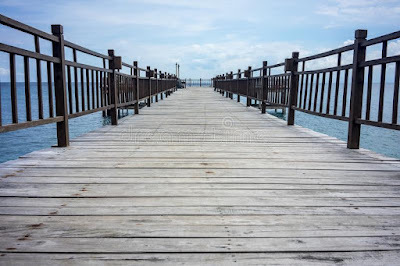
There was once a large pier from which, in the before time, sail boats used to sail to all parts of the world. But now the giant metal behemoths rule the waves and the sail boats are seen there no longer.
Bereft of its former purpose, families now use it to launch their personal water craft, fish from, and picnic on. On a warm summer day, water craft roil the waters as children play upon the still sturdy beams of the dock.
But early in the morning, before the visitors and vacationers arrived, an old sailor could often be seen sitting at the end of the pier. He had no fishing pole nor water craft: he was content to look out upon and listen to the waves. For the sea was in his veins, and though he was no longer a sailor, he still heard the sea’s call. He visited her to watch the sun rise and stayed with her until the crowds began to arrive.
Often, he would simply gaze for long periods of time deep into her depths, communing with some spirit that only those intimate with the sea would know. For the same unknown longing called to him even now as it once called to him as a young man. Where once he traveled the world in hopes that he might find an answer to this longing, as an old man he became content to experience the mystery without the need for answers.
One day, as he stared into the depths that the waves were always trying to conceal and distort, he saw a motion deep within. It was but the briefest of glimpses but it set the hair on the back of his neck at end. It was one of those mysteries of the deep that sometimes rise from the dark and give hints of all that was submerged.
It was big. Of that there was no doubt. He had seen enough in his days to not be mistaken. A glimpse of white that would terrify him if he were in a boat. Would have terrified if he had been a younger man. Terrified him now.
He thought he knew what it was but stared transfixed at the water, looking for confirmation. Again he saw something — just a hint, but it turned the blood within his veins cold. He scanned the waters, his trained eyes fixed to look beneath the surface and the dancing waves that reflected the sky rather than reveal what was within.
And then he saw it again. This time, there was no doubt in his mind. It confirmed the fear that filled his body. A shark. A great shark, its body larger than a life raft, and just as white. He was safe where he crouched as he peered over the edge of the wooden dock, but still fear gripped him. There are some fears men do not outgrow, some fears that reason cannot tame. It swam about, and the old sailor believed he could feel an aura of malevolence around it. Superstition clings tight to those who have long looked into the depths of the sea.
He stared for a while, waiting for the beast to appear once more. He knew it was lurking, knew it was a hunter that sensed prey. He could almost feel its hunger. And while such a thing frightened him, it was this sort of peril which perhaps urged people such as himself to the sea in the first place. Life lived fully is spent in defiance of the jaws of predators.
He would not have noticed the arrival of others were it not for the fact that his every sense was strained in anticipation of spotting the thing again. They were at a distance yet, not on the pier, but they were readying their toys and their tackle, and would soon be headed his way. Another vehicle pulled up as he looked, and another turned around to back a trailer full of water craft into the water. The old sailor walked toward them, waving to them in warning of what he had seen.
The people were familiar with the old sailor who kept mainly to himself and to the water. They thought him odd but harmless. But as he approached them on this day, he looked — as they may have thought to themselves — off his meds. His behavior was wild and in his eyes was a look of danger. “Do not go in the water!” he cried. “There is a shark in it.”
“Show me,” cried a father, entrusting the children to their mother while he walked toward the end of the pier with the old man. The old man, hesitant to lead him too far out, nevertheless did as he was asked.
But when they got to the end of the pier, the father said, “Is that what you see? Why, it’s only a duck.”
And sure enough, there was a duck bobbing gently upon gentle waves, quite unconcerned with the people on the pier and quite unaware of the danger that lurked beneath.
“Not the duck!” said the old sailor, exasperated and angered. “I have lived my life on the sea, surely I know a shark from a duck. Look.” And he pointed down into the depths, because for a brief moment the shark again raised close enough to the surface to be seen by one who knew where to look and what to look for.
“I only see a duck,” said the father, the patronizing tone in his voice thinly veiled.
“You have to look deeper,” cried the old tar. “Anyone can see a duck!”
“And yet I only see a duck,” said the younger man self-assuredly as he slowly turned away from the older man. He waved his wife and children forward. One who has lived his life successfully without ever encountering a shark may grow foolishly confident that he knows best, and feel he need not worry about what has never bothered him before.
As the man walked towards his family, the old sailor observed that the man with the water craft had released them from the trailer into the water. He stood thigh deep in the water, still close enough to shore to be safe but assuredly headed toward danger. Still more people came, heading toward a day of carefree enjoyment. The old sailor went from one party to another, trying to find someone who might heed his warning. Some seemed concerned initially, but with a nod from the father he had first talked to, they seemed to take the warning less seriously. And so they went about their business, heedless of the old man who seemed increasingly emotional and irrational as he went from one person to another.
At last, he despaired of warning anyone at all. He thought of the duck who bobbed among the waves and thought that at the very least he might be able to save him. And so he grabbed a rock and walked back toward the edge of the pier. People had already fired up their water craft and were speeding off from shore towards deeper regions. As they accelerated, they created huge waves behind them which roiled waters, making it impossible for the old sailor — or anyone else — to see what lay within the depths.
The old man neared the edge of the pier and saw the duck bobbing quite comfortably. He changed his grip upon the rock, getting ready to throw it in the duck’s direction, hoping to scare it away from the danger that awaited it. But even as he loosed the rock a violent eruption happened beneath the duck, and in an instant huge white teeth closed over the duck as it was dragged forever more into the darkness of the water and the darkness of the shark’s belly.
The father who the old sailor had spoken to had seen him throw the rock and came forward to see what had happened. Looking out at the water and seeing the duck was gone, the younger man asked, “What did you do to the duck?”
“It was the shark!” the sailor cried.
“It wasn’t a shark,” said the father, disgust in his voice. “It was just a duck. A poor, innocent duck. And you killed it.”
“I didn’t,” cried the old man. But the younger man was done listening. He walked back to his family and the others who were with them, and soon he pulled out his cell phone and could be seen talking to someone. The people on the shore — the crowd continuing to grow — stared out at the old man, who tried to tell whoever might listen of the danger he had seen.
Soon, a squad car arrived. Two police officers walked out onto the pier, spoke briefly with the old sailor, placed handcuffs on his wrists and led him to their car, where they placed him in the back and drove away.
“Is the bad man gone, mommy?” a young boy asked
“Yes, son,” said his loving mom. “It’s safe to go in the water now.”
December 6, 2022
The Road More Travelled (A Prose Poem)

Walk the beaten path and you will get where they want you to go.They will cut down the trees to make the way straight for youKill all the beasts in the jungle so you will not fear to walk throughPour cement so that you do not stumblePut road signs and guard rails so you do not lose your way.They will build oases with chain restaurants so you never leave the highway. They will loan you money for you to buy a carTo drive on their wonderful roadsWhere the trees used to beWhere the animals used to roamWhere the factory farms are now seen Along the side of the highway. And then they will build tollboothsFor you to pay for the roads they builtThat take you where they want you to go. The road to work will be well maintained.The roads to Walmart and from Amazon will be paid for.The road where the water park is,Where the lake used to be,Will be flooded with cars. But no U-turns will be permitted,No loitering along the way.No walking, no public transportationJust millions of people alone in their cars. The unbeaten paths still existThough the streetlights and the car horns encroachThe unbeaten people still walk themTreading lightly, so as not to intrude. They reject the noiseThe pollutionThe destructionThey reject the fast foodAnd the energy drinksAnd the billboards But more than anything they reject the destination.There must be some other way, they say.There must be some other way.
November 13, 2022
The Scream I Will Not Silence
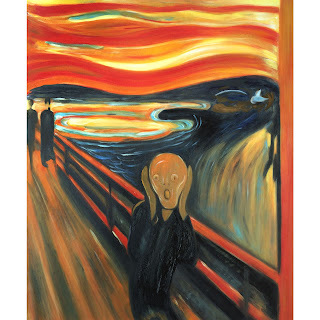
When I contemplate the horror of the atom bombI catch my breath, only to screamThe only acceptable response to mankind’s mass suicide.There is no calm or rational approach to madnessThere is no civil reply to abominationThere is no excuse for the ultimate evilNo explanation, no rationalization.There is only an unending scream. Don’t ask me not to interrupt your brunchThe scream will pierce your eardrums as you eat your quiche.I’ll scream as you watch the Super Bowl and my scream will rise above the roar of the crowdMy scream will continue until the roar of the crowd is one big scream at the greatest of sins.I will scream at your televised debateAnd at your campaign ralliesI will scream until everyone feels the madness that cannot be denied.I will scream at your child’s christening to alert him to the sick truthI’ll scream a scream that sounds like madness but is in fact the only sane response to madness.I will scream for every innocent animal unaware of what we’ve made.I will scream until every man, woman and child feels the same fear and dread and horror that lurks in my heartUntil there is not one corner or bit of darkness in which the madness can hide unperturbed. I will scream because I can do no moreAnd because I can do no lessThere will be no peace Until there is peaceYou will not sleepAnd if you doThe scream will haunt your dreams Don’t ask me to be quietAnd let the grownups talkThe bomb makers and the Jim Jones know-it-allsAnd the good boy media sock puppets Don’t ask me to sit alone in a dark closetFeeling the bugs and worms crawl across my skinThe scream has too long lain silent In my heart alone.
August 11, 2022
A Dream Of A Ridiculous Man (With Apologies To Dostoyevski)

This may sound crazy to you, but I believe we are ripe for a paradigm shift the likes of which the human race has scarcely ever seen. A paradigm shift the likes of which, after it has taken hold, will completely alter our priorities, rendering worthless most of what we now hold dear.
I say this because the Earth can no longer sustain a warlike species capable of creating planet-destroying weapons. I say it because our planet cannot much longer continue to supply a species that is unceasingly ravenous, gluttonous, and wasteful. I say we are about to make what seems like a once in a millennium paradigm shift because that is what appears to be necessary, and I am optimistic enough to say it is going to happen. Don’t get me wrong, I believe the odds are stacked against us, but I am an optimistic person. Why be optimistic when being realistic is much more, well, realistic? It is because I think we need a little optimism to get us started. When you’re facing great odds in a struggle for survival, being realistic is merely weighing the odds in order to be right, rather than victorious. Truth be told, when it comes down to it, I don’t think there is such a thing as being realistic. Deep down you’re either an optimist or a pessimist, and you approach life from one position or the other.
I say that we are about to undergo a radical paradigm shift because Leo Tolstoy already envisioned it and explained how it would take place well over a century ago (see excerpt in comments).
I say it because the way has been pointed out by visionaries and prophets for over three thousand years. The fingers of Jesus Christ, Lao Tzu, Plato, and many others have been pointing the way. Though they may have been considered radical in their day, it is pointless to believe them radical today.
I say it because the 1960’s were an early tremor indicating what is to come, a warning tremor so intense in itself that it nearly toppled existing paradigms. As it was, the ‘60’s created unseen cracks in the foundations of the existing structures and showed just how vulnerable they are.
I say it because it is so obvious that change is coming that only those capable of living a life of delusion are able to deny it. People want it, which is understandable. People fear it, which is also understandable. It is frightening, just as the prospect of walking is frightening to a toddler and riding a bike is frightening to a kindergartner. But change that cannot be avoided must be embraced, and change in this instance cannot be avoided.
I say a radical paradigm shift is happening because I feel the switch has already been flipped on in me. I really don’t feel it is my obligation to support endless war and exploitation against other nations or endless war and exploitation against the earth itself. I say it because I’ve seen it switch on in so many others, and because I see so many others awakening. We are quite willing to stand alone if need be, but we are not alone.
I see the change. They say “buy this” and we say “no”. They say “believe this” and it induces laughter in us. Not a cruel laughter, but a pure and rejuvenating laughter. They say “obey us”, and we use the entirety of our humanity to resist or sidestep their alleged authority. They have the law on their side, but there is a greater weapon we can draw upon, the sympathy of the masses who yet recognize timeless values such as justice and fairness, despite all of their indoctrination. We know they fear us as we once feared them.
“Madness”, you might say. “The mutterings of conspiracy theorists who live within their deranged fantasies. Who or what is this cabal, this star chamber, this alleged but secret group of lizard people or illuminati that controls the world behind an impenetrable curtain?” It is no deep mystery, they are not hidden, nor do they even bother to hide their plans or their motivations. They are simply those who believe the world should be run through domination and subjugation of others, all those who cling to primitive beliefs and attitudes and practices that even 3,000 years ago were seen through by the wise. They belong to no one race, or culture, or gender, or nation, or religion. They are those who use race, culture, gender, nationality, and religion to divide us and thus subjugate us.
We are a dangerous group to those who wish to continue to rule through power and propaganda, because we realize the importance of our cause. There is nothing more worth living for. We cannot live for our progeny, for they are bound up in this. We cannot help but know what we are damning them too should we forsake this transition for the sake of giving them a better position aboard a sinking ship. Nor can we live for our own creature comforts, knowing that the truth will eat into our subconscious minds, allowing us to derive no pleasure from our attempts of escape through denial. Our generation will not pass without witnessing a world of robot dogs and climate breakdown. Our delusions, we feel if not admit, will not endure.
Is it too late? Perhaps. No individual can know his own future, let alone can he predict humanity’s. It is merely our job to awaken, to cease to support that which is killing our planet, our species, and everything we hold dear, and to begin to act according to a higher law, a law of conscience rather than obedience, of faith instead of fear, of mutual assistance rather than competition.
July 20, 2022
A Bird At The Window
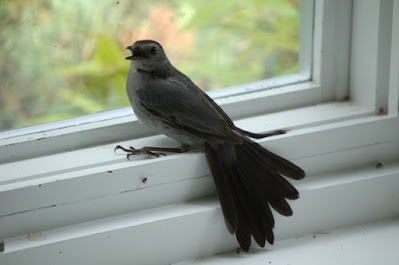
I went into my garage today and noticed a bird that had somehow managed to get in while the car entrance was open but now couldn’t get out. He was spending all his energy at the window, seeing the outdoors but being stopped from getting to it by a barrier he could not see. There he was, trapped in a hot-and-getting-hotter garage, perceiving freedom but unable to achieve it. I told him I was there to help, and I hit the button and soon the garage door was wide open. But the bird was still looking out the window, convinced that this was his doorway to salvation. Eventually I felt I had to approach him and he, not recognizing me as the friend I was, flew away from me towards the now open garage door. Whatever he may think of me, I did him a solid.
It is easy for us as humans to look upon the behavior of animals and laugh at their inability to see the predicaments they sometimes find themselves in. The truth is, though, that without much effort I can use this story as a metaphor for the traps we humans find ourselves and in which we seem unable to extricate ourselves from. I will use one as a short example, knowing full well that humans trapped in such predicaments are no more willing to look upon me as a well-meaning friend than the bird did.
The window is the Democratic Party. The bird is the voter stuck in a dark situation, the temperature getting warmer and warmer. The voter/bird can see where he wants to get, and the window is the most obvious means to getting there. The voter/bird has been exhausting itself for a long time trying to get out of the situation in which he finds himself, but the window, though promising much, will never allow the voter/bird to get to where he wants to go. A window is not meant for that, liberation through such means is impossible. Were the bird capable of thinking on a deeper level, he would clearly see that all it has done so far has been utterly fruitless. But look! There’s the bright blue sky, so promising, so inviting. There is a comfortable-looking tree with branches that offer both safety from those below and a place to sit and enjoy the cooling breeze that rustles its leaves. The little bird/voter believes the problem lies within him, that he needs to flap/vote harder.
Then a human enters, making the situation even more frightening. The bird/voter fears the worst, believing the human is a predator/Republican. Deeply conditioned to fear the unknown, the bird/voter beats its wings more frantically, though the tone of the human’s voice seems friendly enough. The human must be trying, he thinks, to lure him into danger.
Suddenly, there is a loud noise on the other side from where the human stands. Surely another threat, thinks the bird/voter. He does not even dare look towards the opening garage door, certain that it is approaching doom. Would it do so, it would see the bright blue sky, unimpeded by any glass barrier.
Gentle voter, whether you recognize it or not, I am your friend. I wish to release you from the predicament you now face. But if I am ever going to do so, I must try to convince you that you will never escape through the glass window. If ever that window had once been capable of opening and allowing you to escape your prison, it has long ago rusted shut.
I have opened the door for you, offered you an escape. And yet you beat your wings wildly, convinced I am your enemy. You mistake me for a Republican because I suggest another route and you cannot imagine anything other than the window.
What do I do then, gentle voter/bird? Allow you to pound your head against the window until your little lifeless body drops to the concrete? That would be cruel, would it not? Besides, for all my idealism and love for other living beings, I really don’t want to deal with having to pick up a dead bird and stuff it in the garbage.
Is it wrong of me that I approach you, even though you perceive me as an enemy? Is it so bad that I frighten you enough that you fly from your delusion of freedom to escape what you perceive to be an imminent danger? Our goals are the same, little birdy, please forgive me if I grab a broom and direct you towards where freedom awaits. For my freedom and your freedom are inextricably intertwined.
(An imperfect metaphor, but hopefully one worthy of your time)
March 23, 2022
Television Is The Parent That Never Ages
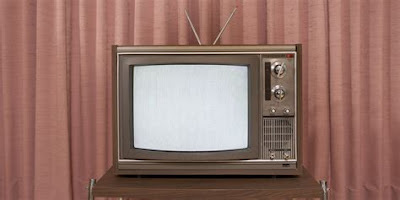
Nearly two decades ago, I got it into my head to write a book about the influence of television on our culture. I was torn between the titles “The Third Parent” and “Adulthood’s End”.
The main premise behind it was that television took over the role of parent in the household. While up until that time parents were the primary role models and authorities in the household, television usurped those roles. And unlike actual parents, television never aged, its position as the maker of decisions never waned.
Most people take on the more difficult aspects of being the adult in the family out of necessity. As parents are no longer able to care for themselves, their children are forced into making decisions for them they had hoped never to make. They realize there is not authority who can make the tough decisions for them, that Mom and Dad are no longer their protectors should they not be up to a task. This is a rite of passage we all must go through. But as television never ages, we never pass that rite, never assume the mantle of maturity. Television is always going to be the one to tell us how to behave, how to dress, what narratives to believe, which culture to consume. As the television only transmits and never receives, how could the relationship ever be otherwise?
Below is a short introduction I did for a book that I’ve been writing in one form or another for decades, but is far from being a reality yet:
It was the latter part of the 1970s and our president was discussing the fuel shortage. He gave a simple suggestion to turn our heat down a few degrees and wear a sweater if we were cold.
It was the sort of advice our parents would have given us and that was the problem. You see, the first generation of children raised on television were now grown up and we did not want to listen to our parents anymore. We preferred to listen to our televisions because the television always told us what we wanted to hear. The television told us we deserved a break today, that sugary snacks were good for us, women were made to be ogled and there were no repercussions to casual sex.
And so a new politician emerged to tell us of the new and improved classic homemade way of doing things. The television had a lovechild and he was called Ronald Reagan. He would explain our world the way we wanted to hear it, just like all those other neat guys on TV. We wanted a handsome and winning personality, not our stuffy old dad. We wanted Ronald Reagan, not Jimmy Carter. Hannity, not Colmes.
We could have whatever we wanted. You go, girl, you deserve it. We could have whiter teeth AND fresher breath. We didn’t have to live with ring around the collar or waxy yellow build up anymore. And so when the voters went to the polls in November of 1980, the changes that had begun in the 1950s had finally come to fruition.
The shift had taken place and the rift between generations, the one television had caused, was glossed over. Never again would we have to listen to adults. Nor would we ever be expected to become adults ourselves. We were all free now to leave the unpleasantness of making difficult decisions behind us. The only choosing we had to make was whether we would drink Miller Lite or Bud Light. We were the Pepsi generation and we were never going to grow old (or up).
There was a new authority now, although we never chose to really think about it that way. We didn’t need parents anymore nor did we have to become them. We could be friends to our children rather than rule makers or—God forbid—role models. We could use the time we weren’t busy making money to spend it. We could buy for a second time all the toys of our youth and never have to be responsible for anything. Because, after all, authority was not given to us, it belonged to the market place. By merely choosing between Pepsi or Coke, magic forces would make the world into a Heaven for us all. Authority was decreed through television waves that mystically traveled through the air and into the privacy of our houses. Complex decision making was uncool, we wanted our nation’s problems to be solved as easily and completely as Jack Tripper’s problems were every Tuesday night on ABC.
As for getting older, well, that was something our parents did. We would have none of that, because growing older meant taking on responsibility, and television would take that burden from us. All we had to do was stay up on the latest trends, buy the products that were currently trendy. We just had to listen to the same music our kids did, pretend to find some value in it. Forget about finding meaning in our own lives, we had to find ways to relate to our children, even if in the end all we did was validate the line being sold to them by the advertisers.
And when the lines and the droopiness and receding hairlines and e.d. showed up, well television was there with the answers. Our skin could look as smooth as Joan Rivers’, our boobs as perky as any saline-bag celebrity. And for guys, hey, it was just like the 60’s, only the drugs now were Rogaine and Viagra. Death was only an illusion, which meant we never had to worry too much about figuring what life was all about. All we had to do was hang onto our youth. All we had to do was keep flunking Maturity 101 so we never had to graduate.
March 6, 2022
Institutionalized Violence Vs. What We're Afraid Of
I suppose we are genetically hardwired to fear the attack of a predatory animal. And from there, it is really no great distance for us to fear the attack of a stranger, a human who means us no good. But as humans evolved and created ever more complex societies, they created a new kind of danger to us humans, not the individual predator but the institutions that are used to keep others in line and obedient, the kind of structures and systems that permit one group of people to rule over another.
Biologically speaking, we have not had time to fully develop an instinctual revulsion of such situations. While early adapters have been aware of them for millennia, most of haven't yet caught up. We fear what lurks in the shadows, the wild animal or the savage man. When it comes to fearing the threat posed by civilization itself, it does not trigger a fight or flee action but instead sits in our guts, causing prolonged stress and neuroses, ruining our lives because we are not aware enough to fight against it. But the greater threats we humans face nowadays are not from attacks by individual animals or humans, but by the very systems of a society we cannot help but belong to.
Too often, the very social structures that seek to rule over us and determine our lives use our primary fear of the lone madman, the violent beast that lurks outside our home, against us.
From the very first lines of my first novel, The Amazing Morse, it is apparent that I have a greater fear of institutionalized violence than I do violent individuals. Here then, is the beginning of The Amazing Morse, an introspection on the fear so many of us fear, consciously or no, of stepping out of line and suffering the power of institutionalized and impersonal violence:
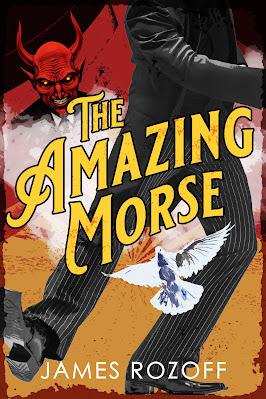
David Morse stared at the book in front of him with a mixture of fascination and fear. It was not the sort of thing that would be of interest to most people, would not even have held his attention on an average workday. But it was a Friday afternoon, a slow ending to an otherwise hectic workweek. And so he allowed his mind to wander over the Folger Adam Security Hardware Catalog, a collection of items intended for use in institutions and prisons. He gazed at pictures of heavy iron hinges built for use on bullet-proof prison doors, at a door slot that allowed food trays to be passed from guard to prisoner, at steel stools attached to steel tables where prisoners were to sit a prescribed distance from their dinner. From these individual items, he constructed within his mind the kind of prison that so many humans called home. A prison cell arranged itself around him, formed from his imagination and his deep-seated fears. A world of gray impenetrability, where every movement was controlled. Such hardware lacked utterly any consideration for color or style or anything that might speak to the humanity of those who lived in such confinement. Their cold metal exteriors were merely meant to be functional. Or perhaps their utilitarian design was intended to convey a message, one of cold indifference to the humans they were meant to contain. Each item was made to erase freewill, to make otherwise unwilling individuals conform to the mechanization of society.
To be sure, there were certain people in the world who could not be controlled in any other way. That there were people capable of killing without remorse was something television was always ready to remind him of, whether through detective dramas, real-life crime shows, or the ever-sensationalistic nightly news. But the institutionalization of such inhumanity scared him more than the individuals it was meant to contain. The criminals and murderers behind these bars were still flesh and blood. In some manner, there was still hope that they might possibly be reached, swayed, appeased. Not so the indifferent metal. It stood between humans and freedom like an immutable law of physics, the first corollary being that bars of steel were stronger than flesh, stronger than bone, stronger perhaps even than the human spirit.
For the moment, the walls of the office cubicle that surrounded him were less real than the prison walls he had conjured in his head. He had long had a fear—perhaps even a terror—of confinement, and he began to feel this fear take control of him. He shuddered as he wondered what would lead a person to such a place where words like choice, freedom, trust, and kindness had no meaning. And then he thought of the Nelson Mandelas of the world, those who had willingly endured such environments, people who had such a love for freedom that they were willing to sacrifice their own for the sake of other's. Surely prison must be even more dreadful for such gentle and developed souls. He could not imagine having the kind of strength needed to make such sacrifice. Neither could he understand the weakness of character that would lead others to such a place. What crime would be so compelling as to risk such an existence?
Then his mind returned to the project on which he had been working. The bid wasn't for a prison or mental institution, it was for a recreation department building in some God-forsaken area of Chicago's inner city. It was the kind of place that people like him—people who went to college and worked in offices—were fortunate enough never to see. The specifications called for such high security applications that it was in violation of numerous safety and fire codes. Some people are born into prisons, he thought. Some people never know any other kind of existence than the ugly and the brutal.



